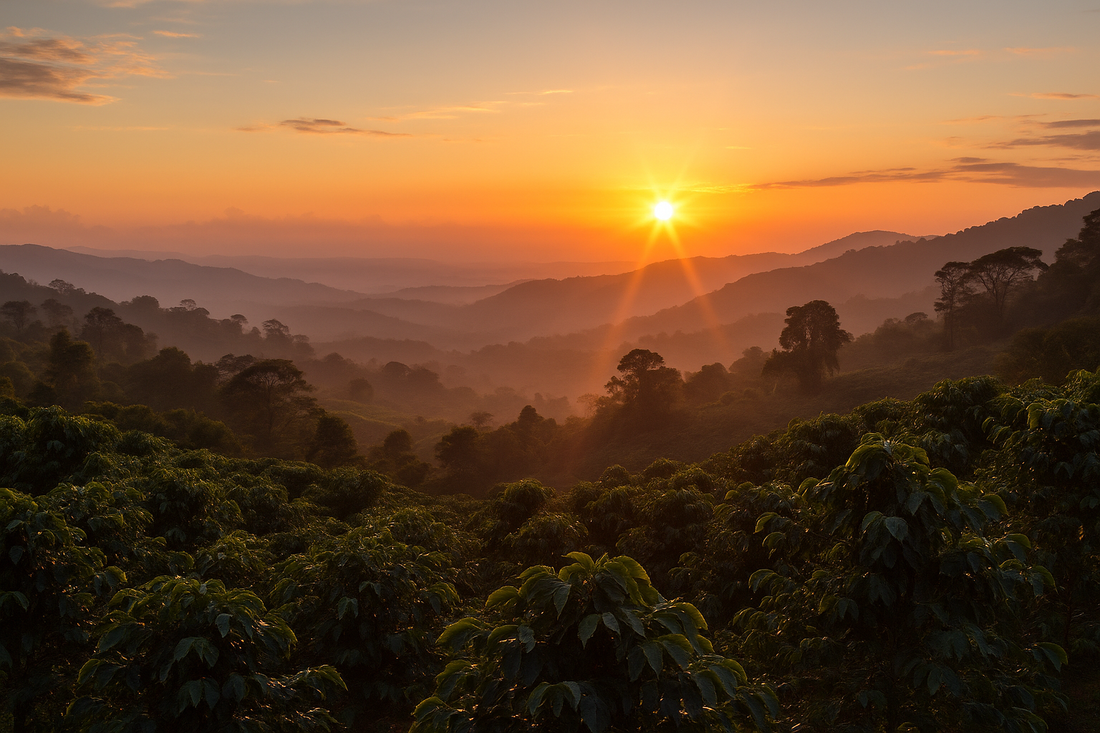
From the Highlands of Panama: The Soul of Coffee Farms
Share

When you sip a cup of Panamanian coffee, you're not just tasting notes of jasmine, stone fruit, or citrus. You’re tasting altitude, volcanic soil, misty mornings, and the quiet dedication of families who have spent generations tending to the land, bean by bean.
At Redfield, we believe that coffee is not just a product—it’s a story. And every story begins at origin.
A Brief History of Coffee in Panama
Coffee arrived in Panama in the early 19th century, brought by European settlers and missionaries. The first plantings took root in the province of Chiriquí, whose highland climate and fertile soil proved perfect for arabica cultivation. But for decades, Panama’s coffee remained mostly a domestic product—overshadowed by larger producers in Latin America.
That all changed in the early 2000s, when the Geisha varietal, grown in the mountains of Boquete, stunned international judges with its floral, tea-like elegance. Suddenly, Panama was on the map—not as a bulk exporter, but as a producer of ultra-premium, microlot coffee that could rival the world’s best.
Today, Panama is known as the “Burgundy of coffee”—a region where altitude, microclimate, and craftsmanship converge.
The Farms That Changed Everything
Each Panamanian coffee farm is unique, but together, they represent a tapestry of excellence:
1. Hacienda La Esmeralda (Boquete)
- Legacy: The farm that made Panama famous.
- Contribution: In 2004, their Geisha won “Best of Panama” and fetched record-breaking prices worldwide.
- Today: Still a global icon of Geisha coffee.
2. Finca Elida – Lamastus Family Estates
- Legacy: Family farm located within Volcán Barú National Park.
- Contribution: Top scoring coffees in international competitions.
- Today: Famous for natural Geisha and innovation.
3. Finca Hartmann (Volcán)
- Legacy: Pioneers of sustainable, shade-grown coffee in Panama.
- Contribution: Champions of natural and experimental processing.
- Today: Synonymous with biodiversity and quality.
4. Janson Coffee Farm (Volcán)
- Legacy: Founded by a Swedish-Panamanian family in the 1980s.
- Contribution: Integrated model with full traceability.
- Today: Known for clean, balanced, high-elevation coffees.
5. Finca Don Benjie (Boquete)
- Legacy: A rising star among smaller farms.
- Contribution: Offers accessible, traceable Geisha and Catuai lots.
- Today: Trusted for high quality and smallholder pride.
6. Finca Nuguo (Renacimiento)
- Legacy: Known for extreme altitudes and isolation.
- Contribution: Won “Best of Panama” 2020 with a washed Geisha.
- Today: Emerging as a frontier of rare, high-altitude flavor.
7. Finca Deborah (Volcán)
- Legacy: Luxury-tier microlot producer.
- Contribution: Pushes boundaries with anaerobic and carbonic maceration processes.
- Today: Their coffees are often featured in barista championships
Understanding Panama’s Coffee Varietals
- Geisha: Floral, jasmine, bergamot, citrus—Panama’s crown jewel.
- Catuai: Smooth, chocolatey, often with balanced acidity.
- Typica: Clean and classic, with heritage notes.
- Pacamara: Spicy, bold, with unique texture.
- SL28: Bright acidity, hints of blackcurrant and tropical fruit.
Processing Methods Used in Panama
Panama is known not just for its varietals, but for how coffee is processed. Here are some of the methods used:
- Washed: Clean, crisp profiles—highlighting terroir.
- Natural: Fruity and full-bodied—dried in the cherry.
- Anaerobic Fermentation: Controlled, sealed-tank process for exotic complexity.
- Carbonic Maceration: Inspired by wine fermentation, leading to intense aromatics and juicy textures.
Panama’s Global Impact
Panama is not a high-volume exporter. Instead, its influence comes from:
- Ultra-premium microlots sold via auction
- Rare varietals like Geisha and Typica
- Direct trade relationships
- Innovative processing techniques (anaerobic, natural, slow drying)
Some Panamanian coffees have sold for over $2,000/lb at international auctions—placing them among the most expensive in the world.
From Farm to Cup




Why Redfield Sources from Panama
We source our coffees from Panama not just for taste—but for values:
- Respect for origin and land
- Ethical labor and traceability
- Artisan-level quality control
- Commitment to the craft of coffee
Every coffee we offer is a tribute to the farmers who nurtured it, the terroir that shaped it, and the journey it made to your cup.
Taste the Story: Our First Harvest Sample Kit
We invite you to discover the magic of Panama through our First Harvest Sample Kit—featuring five curated varietals from distinct terroirs. Each cup is a journey. A conversation with the land. A tribute to those who make it possible.
Tasting Checklist
Want to fully experience your Panamanian coffee? Use this guide:
- Aroma: Smell your coffee before sipping—floral, fruity, or sweet?
- Body: Is it light and tea-like or rich and creamy?
- Flavor: Identify notes—citrus, stone fruit, chocolate?
- Finish: Is the aftertaste clean, juicy, or spicy?
Redfield Coffee Roaster — Coffee with origin. Coffee with soul.
